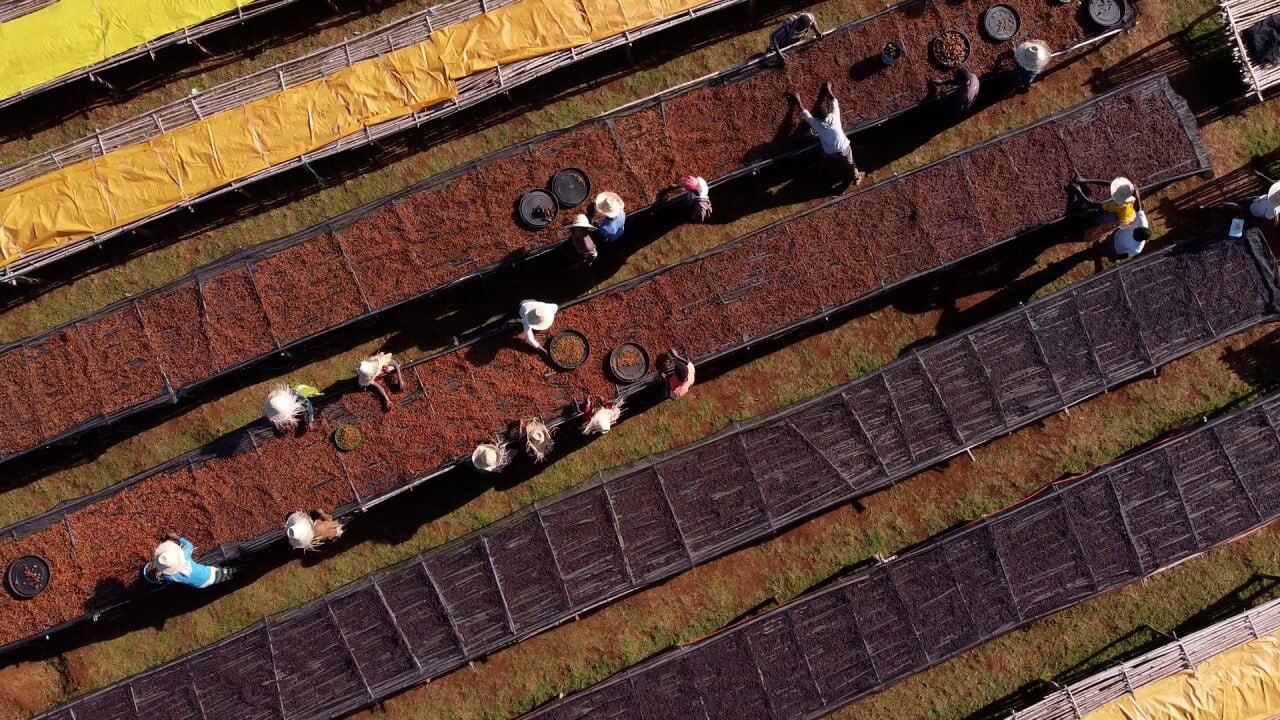This process-washed Yirgacheffe coffee is collected and prepared by our partner EDN Ethiopian Coffee.
Halo Beriti
Ethiopia - Yirgacheffe - Halo Beriti - Q1 - FW
Wählen Sie Ihre Ernte :
Aromatische Noten:
Spottpreis
€/kg
It comes from the trees of the 550 families surrounding the Halo Beriti station
Hand-picked with the utmost care, once brought to the station, the 115 employees of the Halo Beriti station set about washing the coffee. Using a pulper, the beans are separated from their skins, before being washed to remove the mucilage. This operation can take between 12 and 48 hours.
The coffee is then spread out in a thin layer on drying beds, where it will remain for several days, until it reaches a moisture content of 11% and is ready for export.
Marketinginstrumente
POS, Postkarte, QR-Code-Verpackung usw, ...
- Ethiopia
Herkunft
Zone
Yirgacheffe Woreda
Gedeb - Halo Beriti
Station
- EDN - Ethiopian Coffee
Exporter
Art
Arabica Sorten
74112,
74110
Verfahren
Washed
Trocknung
Drying beds
Verpackung
60kg - Jute bags
Höhe
1900 - 2300 Erntezeit
November - Januar Erntemethode
Manuelle
Station Halo Beriti
Haloberiti est un village situé dans la partie sud du district éthiopien de Yirgacheffe Gedeb, en Éthiopie, dans la zone de Gedio. C'est là que se trouve la station de notre partenaire EDN Ethiopian Coffee. Ici, le café est cultivé et traité à des altitudes allant de 1900 à 2300 mètres au-dessus du niveau de la mer, bénéficiant ainsi d'un environnement optimal pour la production de café. La majeure partie du café Haloberiti est cultivée à proximité des jardins des agriculteurs.
Höhe
1900-2300

TreffenEDN - Ethiopian Coffee
Ein paar Worte zu EDN - Ethiopian Coffee
EDN - Ethiopian Coffee harvests coffee from the family farms that surround each of their stations, in the Guji and Gedeo (Yirgacheffe) areas. The farms with which EDN works are small, ranging from 1 to a few hectares maximum. The EDN stations are located in several kebele (villages), such as Benti Nenka, Banko Gotiti, Halo Bereti and Banko Chelchele. There, coffee growing is an integral part of the community's culture. Coffee is always picked by hand, and grown alongside other food crops. This approach maximises the use of the land while providing food for the community.
Analyse auf das nächste Gramm auf- oder abgerundet
Detaillierte physikalische und sensorische Analysen Ihres Kaffees finden Sie im Qualitätsblatt mit:
- Dichte
- Die Luftfeuchtigkeit
- Wasseraktivität
- Farbmetrik
- Das Sieb
- Die Art der Mängel
- Die Partitur und ihre Details
- Das Aromaprofil (herunterladbar)
Kaffees von EDN - Ethiopian Coffee

Auswahl Equipment
Einzelpreis
€ ohne MwSt./Stk.
Ab xx Produkten
€ ohne MwSt./Stk.
Einzelpreis
€ ohne MwSt./Stk.
Ab xx Produkten
€ ohne MwSt./Stk.
Einzelpreis
€ ohne MwSt./Stk.
Ab xx Produkten
€ ohne MwSt./Stk.
Einzelpreis
€ ohne MwSt./Stk.
Ab xx Produkten
€ ohne MwSt./Stk.
Einzelpreis
€ ohne MwSt./Stk.
Ab xx Produkten
€ ohne MwSt./Stk.
Einzelpreis
€ ohne MwSt./Stk.
Ab xx Produkten
€ ohne MwSt./Stk.
Einzelpreis
€ ohne MwSt./Stk.
Ab xx Produkten
€ ohne MwSt./Stk.

